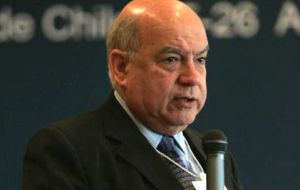MercoPress. South Atlantic News Agency
US/Bolivia clash over trade and drugs; OAS good offices
 OAS Secretary Miguel Insulza
OAS Secretary Miguel Insulza Organization of American States Secretary General Miguel Insulza said on Sunday he would request the United States to reconsider the decision to begin the process of suspending tariff benefits to Bolivia.
Insulza promised "his good offices to ensure that the measure is not implemented", and with that purpose he would begin contacts with the White House and the US Congress this coming week. In an official release the OAS said it "deeply regrets the US decision because of its economic and political effects", which would harm many small Bolivian industries that thrive on exports to the US market and could leave 50.000 workers and their families out of a job and income. Under the Andean Trade and Promotion and Drug Eradication Act many Bolivian goods are allowed into the US market free of tariffs. However benefited countries must comply with certain drug eradication actions. Bolivian Foreign Affairs minister David Choquehuanca described the US decision as "a new aggression against Bolivian democracy" and a revenge for having ousted US ambassador Philip Goldberg whom the administration of President Evo Morales accused of interfering in the country's internal affairs and instigating the massive protests in several provinces. Last Friday a release from US Trade Representative Susan Schwab said that "The Morales administration's recent actions related to narcotics cooperation are not those of a partner and are not consistent with the rules of these programs". "We regret that the proposed suspension that is prompted by the Bolivian government's action could affect hard-working Bolivians," Schwab said adding that once imposed "the suspension could be lifted as soon as the Bolivian government improves its performance". With ATPDEA Bolivia, Ecuador, Peru and Colombia have received duty-free status for most of their goods under a program dating to 1991 to help fight the illegal drug trade. Last year, U.S. imports from Bolivia totaled 362.6 million US dollars, far smaller than from other Andean countries. That included 73 million worth of jewelry and about 20 million of clothing and household textile goods, as well as 64 million of tin, 46 million of crude oil and 20 million of fuel oil. The law governing the program requires the U.S. Trade Representative's office to hold a hearing on the proposed suspension before it takes effect. That hearing has not yet been scheduled, Schwab's office said. Bolivia's recent expulsion of US Agency for International Development personnel and removal of US Drug Enforcement Administration officials from the country's main illegal coca production areas were two reasons behind the proposed suspension of benefits, US trade officials said. "A marked increase in cocaine production, the government's failure to close illegal coca markets, and publicly stated policies that increase government-sanctioned coca cultivation, have placed in doubt the Bolivian government's commitment to cooperate in the fight against drug trafficking," the US Trade Representative's office said. However Choquehuanca denied the claims and said coca cultivation in Bolivia had increased only by 5%. The decision comes after five leading US business groups urged the Bush administration and Congress to consider ending trade benefits for both Bolivia and Ecuador because of what they described as inadequate protections for foreign investors in both countries. The Andean trade preference program will expire at the end of the year unless Congress renews it. The Bush administration has pushed Congress to extend benefits for Colombia and Peru, while mulling what to do about Bolivia and Ecuador.




Top Comments
Disclaimer & comment rulesCommenting for this story is now closed.
If you have a Facebook account, become a fan and comment on our Facebook Page!